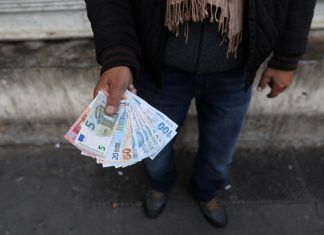The Novel Coronavirus COVID-19 has infected more than 9,000 people and claimed close to 354 lives in Iran so far. The country has been experiencing the economic and financial impact of the outbreak.
Iranian exports to neighboring countries have sharply dropped in the past few weeks. Travel agencies, airlines, and hotels have been among the worst hit businesses, with many people canceling their Nowruz (Iranian New Year) vacations.
Manufacturers, wholesalers, and retailers are also feeling the pinch. Many trade associations have complained about the sharp drop in the volume of business in the past two weeks.
In comments published on the website of Iran Chamber of Guilds (ICG) on March 2, Morteza Miri, the chairman of the Tehran Housewares Trade Association, said: “Following a meeting with housewares manufacturers, everyone agreed to adjust the prices in 2020-21 according to the inflation rate and the value of the dollar. We, however, do not know how much the prices of housewares will go up next year.”
“The housewares market was slowing down before the coronavirus outbreak,” Mr. Miri noted. “People spend their money on life’s essentials, like food and hygiene products during a national emergency. Coronavirus has impacted the housewares industry. Consumer demand for houseware products has dropped as we near Nowruz.”
“We held a meeting with manufacturers to discuss increasing production to meet consumer demand for Nowruz. Unfortunately, the coronavirus outbreak has disrupted production,” Mr. Miri noted. “Given the severity of the economic situation, we have asked the government and the Ministry of Economic Affairs and Finance to provide tax relief to businesses during Mar and Apr.”
Iranians are not spending as much on gifts and non-essential items this year as they customarily do during the Nowruz holidays. Instead, they have been stocking up on food, water, and hygiene products since the coronavirus outbreak. As a result, stores selling clothes, footwear, fashion accessories, and carpets have experienced a sharp drop in revenue in recent weeks.
“Clothing retailers have also been hurt badly,” Alireza Saffari, a member of the Tehran Clothing Industry Association, was quoted by Khabarfoori news website as saying. “People do not go to stores to shop since the coronavirus outbreak.”
“Retail sales have nearly flatlined,” Mr. Saffari explained. “Besides fighting the spread of the coronavirus, the government must help the manufacturers and retailers. Crisis management task forces in other countries provide debt relief to manufacturers. We hope our country does the same.”
[aesop_image img=”https://kayhanlife.com/wp-content/uploads/2018/06/2012-02-25T120000Z_71093431_GM1E82Q02H301_RTRMADP_3_IRAN.jpg” panorama=”off” credit=”REUTERS/Raheb Homavandi” align=”center” lightbox=”off” captionsrc=”custom” caption=”FILE PHOTO:
A shopkeeper counts Iranian bank notes at his shop in a bazar in Tehran. ” captionposition=”left” revealfx=”off” overlay_revealfx=”off”]
Global health organizations have issued guidelines that would help communities to prevent the spread of coronavirus, including “social distancing,” which means canceling large gatherings and restricting personal contacts, and the “self-isolation” of those who show symptoms of the disease. As a result, many people avoid going to restaurants and coffee shops, a trend that has severely impacted those businesses.
“Many business establishments in the food industry will go bankrupt if the government cannot contain coronavirus,” Asadollah Ahmadi Shahrivar, the chairman of Tehran Food Industry Association, said in an interview with Pyameno news website. “Most grocery store owners have received business loans to set up their businesses, and they also pay rent. Many employees and workers will lose their jobs if these businesses shut down. We urge all landlords to extend rent due dates for these shop owners during this challenging period.”
In comments reported by the Gostaresh news website on Mar 4, Eskandar Azmoodeh, the chairman of Tehran Juice and Ice Cream Trade Association, said: “Coffee shops and juice bars have experienced a massive drop in revenue after the coronavirus outbreak, forcing many of them to shut down.”
“Some 80 percent of juice bars are closed now,” Mr. Azmoodeh noted. “Many store owners have fired their workers, which hurts the economy.”
In an interview with the Iranian Students News Agency (ISNA), Ali Bahremand, the chairman of Tehran Confectionaries Trade Association, said sweet shops had reported a massive drop in sales in February and March because of the coronavirus scare.
The outbreak has also impacted the country’s national bus and rail systems and private transport companies.
According to Ahmad Reza Ameri, the chairman of the Tehran Transport Companies Association, many private bus companies have faced a shortage of sanitizing products, which has prevented them from disinfecting the buses they use to service national routes.
Mr. Ameri said the government had not done enough to help private transport companies.
“All bus companies have reported a sharp drop in ticket sales and the number of people traveling, which has impacted the prices,” Ameri noted. “An average bus ticket cost around $12. The price dropped recently because fewer people are traveling now.”
Meanwhile, Gholamhossein Shafeie, the president of the Iran Chamber of Commerce, Industries, Mines and Agriculture (ICCIMA); Saeed Mombeini, the chairman of the Iran Chamber of Guilds (ICG); and Bahman Abdollahi, the head of the Iran Chamber of Cooperatives (ICC) have written to President Hassan Rouhani, urging him to take emergency steps to mitigate the economic impacts of the coronavirus outbreak on the country’s manufacturing sector, transport systems, trades, and service industry.
[Translated from Persian by Fardine Hamidi]





